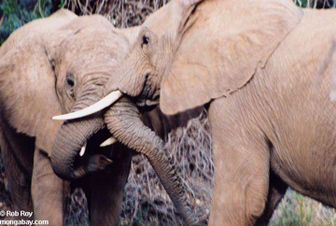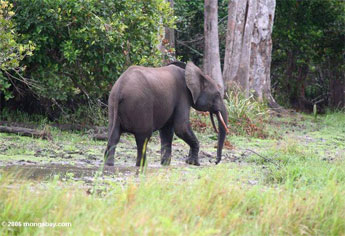African elephants get 9 more years of protection
African elephants get 9-year reprieve
mongabay.com
June 14, 2007
African countries have agreed to extend a ban on ivory exports for another nine years.
In a deal reached Wednesday at the meeting of the UN Convention on International Trade in Endangered Species (CITES) in The Hague, four African countries will be allowed to sell their ivory stockpiles to raise funds for conservation and community development efforts. The ivory had been intercepted from black market transactions and the sale by Botswana, Namibia, South Africa and Zimbabwe had been previously approved. The four countries say their elephant populations are increasing thanks to conservation and law enforcement efforts.
“This consensus is a milestone in elephant history,” said Dr Susan Lieberman, Director of WWF Global Species Programme. “This is the first time in more than 18 years that opposing factions are now speaking with one voice to move this debate forward.”
Nevertheless, WWF expressed reservations about the U.N. meeting’s progress on elephants.
 Photo by Rob Roy |
“Unfortunately, time ran out at the conference to effectively deal with the critical threat to elephants in the wild — poaching and illegal domestic ivory markets,” Dr Lieberman added.
The decision comes as several recent studies suggest a rise in the illegal ivory trade. In early April, a paper published in the journal Public Library of Science study increased poaching of elephants in Central Africa, while another paper, published in February in The Proceedings of the National Academy of Sciences (PNAS), reported that elephants are being slaughtered at the highest rate since the international ban on the ivory trade took effect in 1989. Conservationists say growing demand from China are fueling the trade, which is often conducted by organized criminal gangs.
 Forest elephant in Gabon. Photo by Rhett A. Butler |
Samuel Wasser, director of the University of Washington Center for Conservation Biology and lead author of the PNAS study said that Chinese demand for ivory is driving the black market where the material sells for $750 per kilogram, up from $100 in 1989 and $200 in 2004.
Analysis from the ETIS (Elephant Trade Information System) shows that key problem countries for illegal ivory are: Democratic Republic of Congo, Nigeria, Cameroon, Thailand and China, according to WWF.
Between 1970 and 1989, the African elephant population fell from 1.3 million to about 600,000 in 1989. The current population is estimated to be between 400,000 and 660,000. The African elephant is Earth’s largest land animal.
CITES is charged with overseeing trade in wildlife products.